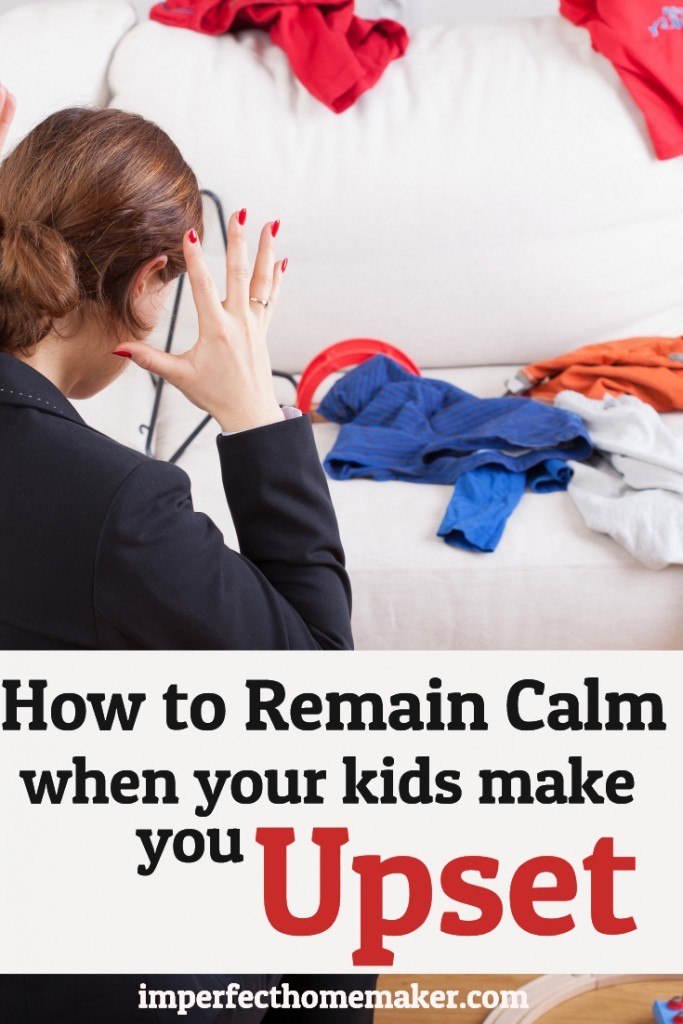How to Remain Calm When Your Kids Make You Upset

“No…wait!” I tried to stop her before she wiped the beet juice from her chin – with her white shirt. But I was a second too late. This is the child that I cannot keep clothed decently because she is constantly using her clothes as a napkin and staining them beyond repair.
“There goes another of her last few remaining decent outfits,” I thought. Beet juice is NOT going to come out of anything.
I wanted to be angry. I wanted to be irritated. I mean, how many times do I have to tell her to use a napkin to wipe her face and not her clothes?
But I stopped and remembered my own words that I have said to this same child many times before. “Tell yourself the truth.” You see, this child is also my highly emotional child. When something doesn't go her way, she doesn't just huff and puff a little bit. She wails over it. She says things that, if she were to stop and think about them are completely not true. Gets in trouble for taking a cookie before supper? “I'm never going to get a cookie ever again in my life!” A brother teases her? “You don't love me!” A toy breaks? “I'm never going to be able to play with toys again! They always break!”
I have to stop her irrational outbursts with an encouragement to tell herself the truth about the situation. Is it really true that you'll never be able to eat a cookie again in your life? Does your brother really hate you? Let's think of something nice he's done for you today. That's not hating you is it? Are all of your toys really going to break? Look at all of the other toys you have. Have they broken?
It seems so crazy for her to get so upset over something so minor, and yet, if I really step back and look at things objectively, it's crazy for me to become angry over something that's actually minor too.
So instead of berating her for forgetting to use her napkin, I chose to tell myself the truth. Out loud. To her face. I pulled her in close and said, “Is mommy going to die because you stained your shirt? Are you going to die because you stained your shirt? No and no. Then things aren't really so bad, are they? It's okay. I'm not angry about the stained shirt. But you do need to remember to use a napkin next time you need to wipe your face.
Telling myself the truth calmed my spirit and kept me in control of my reaction. I didn't say anything I would regret later.
We must remember to tell ourselves the truth on a daily (hourly? minute-by-minute?) basis. Every time we're tempted to react in anger toward something our child has done, we must stop and tell ourselves the truth about the situation.
Someone spilled the entire gallon of milk and we don't have money in the budget to buy another one until next week? Is yelling at my child for getting the milk out without permission going to change anything or bring back the gallon of milk? Will I even remember the spilled gallon of milk next month or even next week? This is not a life-changing event, and I should not get bent out of shape about it.
I've reminded my child three times to clean his room and he still hasn't done it? What good does responding in anger do? It teaches him that the reason he should clean his room is to keep from making mom mad. But the truth is that he needs to do it simply because it's the right thing to do. So instead of becoming angry, I can look to the root of the problem and address that directly. Is it a laziness problem? I need to point him to scriptures concerning laziness, help him memorize those, and pray for him to have victory in this area of his character. Is it a matter of feeling overwhelmed and not knowing where to start? I can give him more specific instructions, such as to make his bed or put his dirty clothes in the hamper.
Telling ourselves the truth is one of the best ways to remain in control of our spirit. Most of the time exploding in anger is going to do more harm than good and will do nothing to change the situation. Most of the incidents that make us want to explode don't seem so bad when we look at them outside the heat of the moment; therefore, retreating from the situation until we can tell ourselves the truth objectively is a wise thing to do.
So next time you feel that explosion bubbling under the surface, remember: Tell the Truth!
This post is part of the Parenting with Gentleness series
For more help thinking on what is true, you may want to use this Philippians 4:8 printable.
